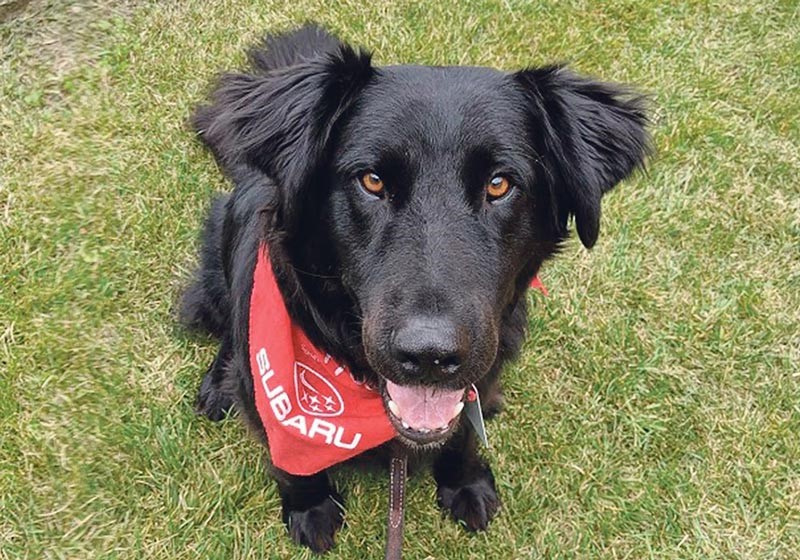
Online therapy dog program to continue this fall following positive survey results
Therapy dogs and their handlers will continue to offer online sessions during the Fall 2020 term
By Shannon Boklaschuk
Responses to a recent survey that asked members of the University of Saskatchewan (USask) community about the PAWS Your Stress Therapy Dog Program highlighted “the power of connection between humans and animals” during the COVID-19 pandemic.
“Nearly 400 people responded to the survey and we learned that people wanted to visit the therapy dogs primarily to reduce stress, because they missed them, and because they wanted to learn about therapy dogs,” said Dr. Linzi Williamson (PhD).
“People shared that they would also like to see the dogs playing, performing tricks, training, and hanging out in their homes. And as much as people would prefer to see the therapy dogs in person, they would still like to see them online.”

PAWS Your Stress events featuring the therapy dogs started taking place online on April 20, after the university closed due to the global coronavirus health crisis. Over the summer, online therapy dog visits took place on Facebook Live (@PAWSYourStress), while recorded videos were shared on additional platforms, including Instagram (@pawsyourstress), Twitter (@PawsStress), and YouTube (PAWSYourStress). Funding for the project was provided by the Saskatchewan Health Research Foundation (SHRF) and the Office of the Research Chair in One Health and Wellness.
The online survey was conducted from July 10 – 27. Williamson, a post-doctoral fellow in the office of Dr. Colleen Dell (PhD), said the survey responses “really highlight the power of connection between humans and animals, even when physical touch and petting the dogs is not possible.”
“Many people have formed relationships with the therapy dogs and are interested in their lives. The dogs also seem to relate for people in a positive way to their mental health and general well-being,” she said.
The therapy dogs and their handlers will continue to offer online sessions during the Fall 2020 term, when the majority of USask classes will be delivered remotely due to the COVID-19 pandemic. Zoom sessions will be held from 1 pm – 2 pm on Sept. 17; on Oct. 1, 15, and 29; on Nov. 12 and 26; and on Dec. 8, 10, 15, and 17. People can register for the sessions online.
“Many of our regular St. John Ambulance therapy dogs that were visiting on campus prior to COVID-19 will be back visiting online,” said Dell, a sociology professor in USask’s College of Arts and Science and the university’s Centennial Enhancement Chair in One Health and Wellness.
“Being online also offers us the opportunity to reintroduce some of our retired campus therapy dogs, like my 13-year-old Boxer, Kisbey. As well, we are able to include St. John Ambulance therapy dogs that are in training—and we will even have some special feline guests.”
Dell said the therapy dog program has amassed quite a few fun videos and children’s book readings since transitioning to an online format in April. Fifteen book readings have been produced in partnership with Scholastic Canada, with two in French, as well as nearly 60 videos. All of the material will still be available to viewers, with more resources to be added as the new academic term starts.
.jpg)
Dell said connection is very important to mental health, and providing connection is what the therapy dog program is all about. In June, Dell’s team worked alongside the Canadian Centre on Substance Use and Addiction, and the Mental Health Commission of Canada, to develop a poster offering information on how the connection between animals and humans can help reduce feelings of stress and anxiety during the pandemic. The poster also provides tips for reducing the harms associated with using alcohol, cannabis, and other substances.
“It is pretty clear that this pandemic has been stressful on our collective wellness as a community, while at the same time being an individualized experience. We know that mental health is a concern on the university campus, and without doubt this has been added to with the pandemic—from students dealing with starting the semester physically isolated from their classmates and campus activities, through to instructors trying to prepare their classes for remote delivery,” said Dell.
“The therapy dogs and handlers visited campus prior to COVID-19 because they care, and there is nothing preventing them from continuing to display this care in a virtual environment.”
Transitioning the therapy dog program to an online format has required a lot of patience and creativity on everyone’s part—including on the part of the therapy dogs, said Dell.
“That said, our evaluation has shown us that the PAWS Your Stress Therapy Dog Program goals of offering attendees comfort and support was attained, just in a different way,” she said. “We have been very flexible in responding to community need and will be sure to continue this for our university community, so I foresee some special online events and contests being announced. If anyone has ideas, please be in contact with us. And all of our handlers continue to work to make the online experience enjoyable for the dogs—which often involves a lot of cookies.”
PAWS Your Stress, which began in 2014, is a partnership between Dell’s office, Peer Health, and the St. John Ambulance Therapy Dog Program. Learn more about the online therapy dog program and the research team behind it—Dell, Williamson, Ben Carey, Maryellen Gibson, Maria Cruz, and Dr. Holly McKenzie (PhD)—by visiting therapydogs.ca.
The program’s campus partners include the Office of the President, Student Health Services, the Western College of Veterinary Medicine, the University Library, the One Health and Wellness Research Chair, Be Well, and What’s Your Cap. Off-campus partners include the Canadian Centre on Substance Use and Addiction and the St. John Ambulance Therapy Dog Program.


